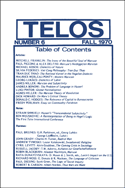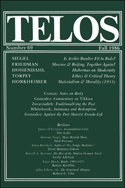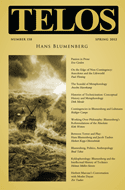By Danilo Breschi · Wednesday, April 4, 2012 There seems to be a need for a book like this amid the celebration of the 150th anniversary of the unification of Italy. Pensare l’Italia (2011, Einaudi) is the title of a tightly organized and explosive dialogue between Ernesto Galli della Loggia and Aldo Schiavone, two conversationalists who relate to each other like night and day. At times their dialogue seems to be a conversation between the deaf or a juxtaposition of two monologues. Although they rarely agree, it may benefit the reader to have access to two books instead of one.
Continue reading →
By Tomash Dabrowski · Tuesday, April 3, 2012 As an occasional feature on TELOSscope, we highlight a past Telos article whose critical insights continue to illuminate our thinking and challenge our assumptions. Today, Tomash Dabrowski looks at Maurice Merleau-Ponty’s “Western Marxism,” from Telos 6 (Fall 1970).
 Prior to 1960, the work of György Lukács was largely unknown in France; Lukács’s work had only belatedly gained influence there with Lucien Goldmann’s translation of History and Class Consciousness almost forty years after its first publication, and five years after the 1955 publication of Merleau-Ponty’s study of his work in Les Aventures de la Dialectique. Merleau-Ponty had in a sense anticipated the French debates on Lukács’s otherwise eminent text, already having cited passages from History and Class Consciousness in 1946. “Western Marxism,” however, is a meditation on a Marxism far removed from the type that Merleau-Ponty was enthusiastic about almost ten years prior. Until 1950 his political commitments were supportive, albeit cautiously, toward the Soviet project; the present work is however concurrent with a disillusionment of institutionalized Marxism, a cynicism that had grown in Merleau-Ponty since the Korean War. Prior to 1960, the work of György Lukács was largely unknown in France; Lukács’s work had only belatedly gained influence there with Lucien Goldmann’s translation of History and Class Consciousness almost forty years after its first publication, and five years after the 1955 publication of Merleau-Ponty’s study of his work in Les Aventures de la Dialectique. Merleau-Ponty had in a sense anticipated the French debates on Lukács’s otherwise eminent text, already having cited passages from History and Class Consciousness in 1946. “Western Marxism,” however, is a meditation on a Marxism far removed from the type that Merleau-Ponty was enthusiastic about almost ten years prior. Until 1950 his political commitments were supportive, albeit cautiously, toward the Soviet project; the present work is however concurrent with a disillusionment of institutionalized Marxism, a cynicism that had grown in Merleau-Ponty since the Korean War.
Continue reading →
By Telos Press · Friday, March 30, 2012 Telos Press maintains an active, year-round, and global internship program, a valuable learning experience in which undergraduate and graduate students assist with the publication and marketing of the journal Telos as well as Telos Press books. We are looking for assistance with social media efforts and outreach (Twitter, Facebook, LinkedIn) as well as public relations and marketing research. Our main office is located in the heart of New York City’s East Village.
Continue reading →
By Adrian Pabst · Thursday, March 29, 2012 At the ABC (Australia) Religion & Ethics website, Telos Associate Editor Adrian Pabst recently discussed the crisis of global capitalism, Pope Benedict’s vision of a civil economy, and the possibilities of a Catholic Christian “third way”:
The year 2011 witnessed a new wave of protest movements and unprecedented popular outrage across the globe. From the protests in North Africa and the Middle East to the Occupy Wall Street movement in the United States to the camps outside St Paul’s Cathedral in London and Moscow, demonstrators have expressed a deep-seated anger at global finance that is shared by many.
Continue reading →
By Tomash Dabrowski · Tuesday, March 27, 2012 As an occasional feature on TELOSscope, we highlight a past Telos article whose critical insights continue to illuminate our thinking and challenge our assumptions. Today, Tomash Dabrowski looks at Max Horkheimer’s “Materialism and Morality,” from Telos 69 (Fall 1986).
 In 1933, the rise of National Socialism had terminated the Frankfurt School’s residency in Germany, and “Materialism and Morality” marks the last contribution by Max Horkheimer to the Institute’s journal, the Zeitschrift für Sozialforschung, while still located in Frankfurt. In this respect, the present essay is a macrocosm of the development of the thought of the Frankfurt School at the cusp of exile. Key concepts in Horkheimer’s more widely known mature work already germinate in “Materialism and Morality,” but the essay’s unique position in his individual intellectual development likewise straddles the ongoing process of elaborating a cohesive sociological vision for the institute. The still nascent idea of a “Critical Theory,” which is now synonymous with the school, had yet to wait four years to be coined by Horkheimer; indeed “Materialism and Morality” is part of a still continuing clarification of what an interdisciplinary critical method might look like in application. In 1933, the rise of National Socialism had terminated the Frankfurt School’s residency in Germany, and “Materialism and Morality” marks the last contribution by Max Horkheimer to the Institute’s journal, the Zeitschrift für Sozialforschung, while still located in Frankfurt. In this respect, the present essay is a macrocosm of the development of the thought of the Frankfurt School at the cusp of exile. Key concepts in Horkheimer’s more widely known mature work already germinate in “Materialism and Morality,” but the essay’s unique position in his individual intellectual development likewise straddles the ongoing process of elaborating a cohesive sociological vision for the institute. The still nascent idea of a “Critical Theory,” which is now synonymous with the school, had yet to wait four years to be coined by Horkheimer; indeed “Materialism and Morality” is part of a still continuing clarification of what an interdisciplinary critical method might look like in application.
Continue reading →
Telos 158 (Spring 2012) is now available for purchase in our store.
 This special issue of Telos focusing on the work of the German philosopher Hans Blumenberg aims to reinvigorate the critical engagement with his work in the English-speaking world by casting a new light on his thought and its fundamental concerns. The American reception of Blumenberg reached an initial high point in the late 1980s and 1990s with Robert M. Wallace’s remarkable translation of three monumental volumes: The Legitimacy of the Modern Age (1983), Work on Myth (1985), and The Genesis of the Copernican World (1987). This reception often (though not exclusively) focused on the questions prompted by Blumenberg’s contributions to the secularization debates surrounding thinkers such as Karl Löwith, Carl Schmitt, and Ernst Kantorowicz. In what can be read as a response to Schmitt’s famous claim that “all significant concepts of the modern theory of the state are secularized theological concepts,” Blumenberg introduces the notion of reoccupation (Umbesetzung). With it he argues against the continuity of theology as the “answer” to the question of the political in favor of the persistence of questions, including that of the political, that are constantly re-answered in original ways. Hence, the modern state for Blumenberg is not based on secularized theological concepts but on new answers to ongoing questions; modernity thus possesses at least the relative “legitimacy” characteristic of systems and institutions in general. For Blumenberg, the latter are never completely originary or purely (i.e., legitimately) derived but are always the result of the complex system of exigencies that produce each “reoccupation.” The specific quality of the modern age, which differentiates it from all others, is “self-assertion” (Selbstbehauptung), a paradoxical form of self-legitimation according to which historical transfers and traditions are the basis for unprecedented new formations. Such questions of secularization, together with their important implications for a theory of modernity and the conceptualization of history, have been discussed and debated by prominent thinkers like Robert Pippen, Richard Rorty, Martin Jay, and Elizabeth Brient. This special issue of Telos focusing on the work of the German philosopher Hans Blumenberg aims to reinvigorate the critical engagement with his work in the English-speaking world by casting a new light on his thought and its fundamental concerns. The American reception of Blumenberg reached an initial high point in the late 1980s and 1990s with Robert M. Wallace’s remarkable translation of three monumental volumes: The Legitimacy of the Modern Age (1983), Work on Myth (1985), and The Genesis of the Copernican World (1987). This reception often (though not exclusively) focused on the questions prompted by Blumenberg’s contributions to the secularization debates surrounding thinkers such as Karl Löwith, Carl Schmitt, and Ernst Kantorowicz. In what can be read as a response to Schmitt’s famous claim that “all significant concepts of the modern theory of the state are secularized theological concepts,” Blumenberg introduces the notion of reoccupation (Umbesetzung). With it he argues against the continuity of theology as the “answer” to the question of the political in favor of the persistence of questions, including that of the political, that are constantly re-answered in original ways. Hence, the modern state for Blumenberg is not based on secularized theological concepts but on new answers to ongoing questions; modernity thus possesses at least the relative “legitimacy” characteristic of systems and institutions in general. For Blumenberg, the latter are never completely originary or purely (i.e., legitimately) derived but are always the result of the complex system of exigencies that produce each “reoccupation.” The specific quality of the modern age, which differentiates it from all others, is “self-assertion” (Selbstbehauptung), a paradoxical form of self-legitimation according to which historical transfers and traditions are the basis for unprecedented new formations. Such questions of secularization, together with their important implications for a theory of modernity and the conceptualization of history, have been discussed and debated by prominent thinkers like Robert Pippen, Richard Rorty, Martin Jay, and Elizabeth Brient.
Continue reading →
|
|
 Prior to 1960, the work of György Lukács was largely unknown in France; Lukács’s work had only belatedly gained influence there with Lucien Goldmann’s translation of History and Class Consciousness almost forty years after its first publication, and five years after the 1955 publication of Merleau-Ponty’s study of his work in Les Aventures de la Dialectique. Merleau-Ponty had in a sense anticipated the French debates on Lukács’s otherwise eminent text, already having cited passages from History and Class Consciousness in 1946. “Western Marxism,” however, is a meditation on a Marxism far removed from the type that Merleau-Ponty was enthusiastic about almost ten years prior. Until 1950 his political commitments were supportive, albeit cautiously, toward the Soviet project; the present work is however concurrent with a disillusionment of institutionalized Marxism, a cynicism that had grown in Merleau-Ponty since the Korean War.
Prior to 1960, the work of György Lukács was largely unknown in France; Lukács’s work had only belatedly gained influence there with Lucien Goldmann’s translation of History and Class Consciousness almost forty years after its first publication, and five years after the 1955 publication of Merleau-Ponty’s study of his work in Les Aventures de la Dialectique. Merleau-Ponty had in a sense anticipated the French debates on Lukács’s otherwise eminent text, already having cited passages from History and Class Consciousness in 1946. “Western Marxism,” however, is a meditation on a Marxism far removed from the type that Merleau-Ponty was enthusiastic about almost ten years prior. Until 1950 his political commitments were supportive, albeit cautiously, toward the Soviet project; the present work is however concurrent with a disillusionment of institutionalized Marxism, a cynicism that had grown in Merleau-Ponty since the Korean War.  In 1933, the rise of National Socialism had terminated the Frankfurt School’s residency in Germany, and “Materialism and Morality” marks the last contribution by Max Horkheimer to the Institute’s journal, the Zeitschrift für Sozialforschung, while still located in Frankfurt. In this respect, the present essay is a macrocosm of the development of the thought of the Frankfurt School at the cusp of exile. Key concepts in Horkheimer’s more widely known mature work already germinate in “Materialism and Morality,” but the essay’s unique position in his individual intellectual development likewise straddles the ongoing process of elaborating a cohesive sociological vision for the institute. The still nascent idea of a “Critical Theory,” which is now synonymous with the school, had yet to wait four years to be coined by Horkheimer; indeed “Materialism and Morality” is part of a still continuing clarification of what an interdisciplinary critical method might look like in application.
In 1933, the rise of National Socialism had terminated the Frankfurt School’s residency in Germany, and “Materialism and Morality” marks the last contribution by Max Horkheimer to the Institute’s journal, the Zeitschrift für Sozialforschung, while still located in Frankfurt. In this respect, the present essay is a macrocosm of the development of the thought of the Frankfurt School at the cusp of exile. Key concepts in Horkheimer’s more widely known mature work already germinate in “Materialism and Morality,” but the essay’s unique position in his individual intellectual development likewise straddles the ongoing process of elaborating a cohesive sociological vision for the institute. The still nascent idea of a “Critical Theory,” which is now synonymous with the school, had yet to wait four years to be coined by Horkheimer; indeed “Materialism and Morality” is part of a still continuing clarification of what an interdisciplinary critical method might look like in application.  This special issue of Telos focusing on the work of the German philosopher Hans Blumenberg aims to reinvigorate the critical engagement with his work in the English-speaking world by casting a new light on his thought and its fundamental concerns. The American reception of Blumenberg reached an initial high point in the late 1980s and 1990s with Robert M. Wallace’s remarkable translation of three monumental volumes: The Legitimacy of the Modern Age (1983), Work on Myth (1985), and The Genesis of the Copernican World (1987). This reception often (though not exclusively) focused on the questions prompted by Blumenberg’s contributions to the secularization debates surrounding thinkers such as Karl Löwith, Carl Schmitt, and Ernst Kantorowicz. In what can be read as a response to Schmitt’s famous claim that “all significant concepts of the modern theory of the state are secularized theological concepts,” Blumenberg introduces the notion of reoccupation (Umbesetzung). With it he argues against the continuity of theology as the “answer” to the question of the political in favor of the persistence of questions, including that of the political, that are constantly re-answered in original ways. Hence, the modern state for Blumenberg is not based on secularized theological concepts but on new answers to ongoing questions; modernity thus possesses at least the relative “legitimacy” characteristic of systems and institutions in general. For Blumenberg, the latter are never completely originary or purely (i.e., legitimately) derived but are always the result of the complex system of exigencies that produce each “reoccupation.” The specific quality of the modern age, which differentiates it from all others, is “self-assertion” (Selbstbehauptung), a paradoxical form of self-legitimation according to which historical transfers and traditions are the basis for unprecedented new formations. Such questions of secularization, together with their important implications for a theory of modernity and the conceptualization of history, have been discussed and debated by prominent thinkers like Robert Pippen, Richard Rorty, Martin Jay, and Elizabeth Brient.
This special issue of Telos focusing on the work of the German philosopher Hans Blumenberg aims to reinvigorate the critical engagement with his work in the English-speaking world by casting a new light on his thought and its fundamental concerns. The American reception of Blumenberg reached an initial high point in the late 1980s and 1990s with Robert M. Wallace’s remarkable translation of three monumental volumes: The Legitimacy of the Modern Age (1983), Work on Myth (1985), and The Genesis of the Copernican World (1987). This reception often (though not exclusively) focused on the questions prompted by Blumenberg’s contributions to the secularization debates surrounding thinkers such as Karl Löwith, Carl Schmitt, and Ernst Kantorowicz. In what can be read as a response to Schmitt’s famous claim that “all significant concepts of the modern theory of the state are secularized theological concepts,” Blumenberg introduces the notion of reoccupation (Umbesetzung). With it he argues against the continuity of theology as the “answer” to the question of the political in favor of the persistence of questions, including that of the political, that are constantly re-answered in original ways. Hence, the modern state for Blumenberg is not based on secularized theological concepts but on new answers to ongoing questions; modernity thus possesses at least the relative “legitimacy” characteristic of systems and institutions in general. For Blumenberg, the latter are never completely originary or purely (i.e., legitimately) derived but are always the result of the complex system of exigencies that produce each “reoccupation.” The specific quality of the modern age, which differentiates it from all others, is “self-assertion” (Selbstbehauptung), a paradoxical form of self-legitimation according to which historical transfers and traditions are the basis for unprecedented new formations. Such questions of secularization, together with their important implications for a theory of modernity and the conceptualization of history, have been discussed and debated by prominent thinkers like Robert Pippen, Richard Rorty, Martin Jay, and Elizabeth Brient. 

